Very Rare Find & Sharp! Only 76k Believed Orig Miles, 161ci Hurricane Six, Wow!
- Condition: Used
- Make: Willys
- Model: Aero Lark
- Type: Sedan
- Year: 1954
- Mileage: 76950
- VIN: 654KB310868
- Color: Gray
- Engine size: 161 c.i. 6 cylinder
- Power options: --
- Fuel: Gasoline
- Transmission: Manual
- Interior color: Gray
- Options: --
- Vehicle Title: --
1954 Willys Aero Lark Description
The short-lived line of Willis Aero cars is a very interesting piece of American automotive history. Built by the Willys Motors Inc. (the year prior, Willis-Overland was purchased by Kaiser and renamed) as a low-cost alternative to the Big 3, cars like this 1954 Willys Aero Lark were a precursor to the light-weight compact cars to come down the pike in the near future, and despite the car's eventual demise and relegation to the South American market several years later, they helped pave the way for the European and Japanese compacts to gain a foothold in America. That is not insignificant, as it also changed the focus of the Big 3, resulting in a plenitude of compact car options for the American family from a variety of manufacturers, ostensibly molding the way the car industry is set-up today. Cars that escaped the crusher like this '54 Aero Lark sedan are super-rare, and finding one that can actually be regularly driven and enjoyed is all but a fable these days.1954 was the most ambitious of the Willys Aero models, with available Lark, Ace, and Eagle submodels that offered refined styling on their surprisingly wide and long 108-inch wheelbase dimensions. Those platform specs would be copied for years to come, as the car provided room for a family of six in a pinch, a fact that was not lost on the American consumer. Proposed by an ex-Packard engineer and styled by famed designer Phil Wright, the Aeros were meant to be easy to build for the struggling Willys division of Kaiser at their plant in Toledo, but they were also meant to look stylish with a minimal amount of flair - focusing mostly on being an economical car that was a lot of fun to drive because of its advantageous power-to-weight ratio and comfortable suspension. Notable upgrades for the year included a wraparound one-piece windshield, 'hooded' headlight and parking light bezels, larger taillights, and redesigned bumper guards. Wearing rather nondescript gray paint that's reported to be the car's lone repaint, this one looks exactly the way it might have on Main Street circa 1954, easily tooling around town where its trim size and great maneuverability were a big asset. And Willys stylists did work wonders with it, as it shows wonderful details like the ornate open-mouth front grille with integrated 'W' badge and the neat little kick-up for the taillights that proves fins were not just for the big cars. Despite the low overall production numbers, the 4-door post sedans were the most commonly built Aeros, and thanks to great preservation and a reported 2-owner history, it remains in solid driver-quality condition throughout, without any of the rust issues that plagued so many of these compact cars decades ago.
The interior is even more of a treat, with period textures and materials that make the affordable Lark feel special. The floor is covered by a rubber mat that looks to have been replaced not long ago, but the wide bench seats sport two-tone seat covers and door panels to match, all of which are likely original to the car. The redesigned dashboard is post-war simple with an all-in-one gauge cluster that will be familiar to both Willys and Kaiser fans. The matching steering wheel and column-mounted shifter offer light control efforts and a splash of color in the super-cool horn button, which sports a stylized "W" emblem. The back seat is spacious enough for three in a pinch, with plenty of headroom thanks to the 4-door post design of the base-model Lark. Focusing on value, this one is light on options, set-up with only a heater (currently inoperable) and AM radio from the factory, but again, that's all part of this economical compact's charm. Out, the trunk includes a full-sized spare with an original cover, along with original mat covering the floors.
Probably the most appealing part of the Willys-Aeros was the surprisingly excellent performance, as the power-to-weight ratio of these cars was incredibly advantageous. Based on the submodel, you got a choice of two motors in your Aero: the base-model I-4 "Hurricane" or up-model I-6 "Hurricane Six". This particular model, the Aero Lark (this is an import-market car, so there may be some variables that are difficult to trace back to Toledo), is reported to sport the believed-original 161 Hurricane Six, which sports a hefty factory-rated 90 horsepower. That may not seem like a lot today, but for a 1954 compact model that only weighed approximately 2500 pounds, it's very impressive. It's energetic around town and will happily cruise at 50mph, and in fact, this engine might make the Aero a smart hobby car today, as it often pulled down as much as 27 MPG while 'country driving', and there's no reason it can't do it today. The engine bay is detailed properly, with black paint on the engine, a big oil bath air cleaner, and the original 6-volt generator, which still spits out great starting power. The ratios in the 3-speed transmission are well chosen and the suspension is more-than-capable and quite frankly ahead of its time, with a modern coil-spring style front and more conventional leaf-spring set-up in the back that handles great and gives the car solid riding comfort. It's uber-solid underneath and features a burbling single exhaust with a newer chambered muffler, as well as color-matched painted steel wheels adorned with period-correct Willys hubcaps all wrapped in 6.00-15 bias-ply white-walls.
A piece of automatic history that represents one of the final breaths of life for Willys in North America, this Aero-Lark is an amazingly rare find. Featuring several original documents and manuals, this is the esoteric compact you want if you're going rare game hunting. Or, if you're just looking for a great classic driver with one of the coolest histories in the industry, it's got that in spades too. Call today!
More Willys classic cars for sale
 Believed original 134ci hurricane motor nicely restored Jeepster
Believed original 134ci hurricane motor nicely restored Jeepster
 RARE 4x4 HURRICANE 6 CYLINDER NEW PAINT COLLECTOR
RARE 4x4 HURRICANE 6 CYLINDER NEW PAINT COLLECTOR
 4x4 HURRICANE 6 CYLINDER COLLECTOR GRADE RARE
4x4 HURRICANE 6 CYLINDER COLLECTOR GRADE RARE
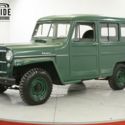 4x4 HURRICANE 6 CYLINDER MANUAL RARE COLLECTOR WAGON MUST SEE
4x4 HURRICANE 6 CYLINDER MANUAL RARE COLLECTOR WAGON MUST SEE
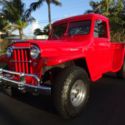 RARE Willys Pick-Up Truck 4x4, A/C, MINT, Original 6-226 Super Hurricane
RARE Willys Pick-Up Truck 4x4, A/C, MINT, Original 6-226 Super Hurricane
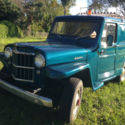 1962 Willy’s Utility Wagon, Original 226 Hurricane Engine, frame & body - RARE!!
1962 Willy’s Utility Wagon, Original 226 Hurricane Engine, frame & body - RARE!!
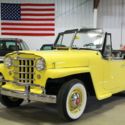 1950 Willys Jeepster 64237 Miles Yellow Convertible Hurricane 4-Cylinder 3-Spee
1950 Willys Jeepster 64237 Miles Yellow Convertible Hurricane 4-Cylinder 3-Spee
 1952 Willys Jeep Pickup 4 X 4 OD Rare low miles garage kept since new ALL ORIG.
1952 Willys Jeep Pickup 4 X 4 OD Rare low miles garage kept since new ALL ORIG.
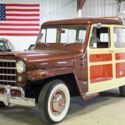 1950 Willys Utility Wagon 96105 Miles Brown Station Wagon Hurricane 4-Cylinder
1950 Willys Utility Wagon 96105 Miles Brown Station Wagon Hurricane 4-Cylinder
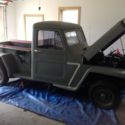 Willys pickup 1962 6-226 Super Hurricane
Willys pickup 1962 6-226 Super Hurricane
 Believed original 134ci hurricane motor nicely restored Jeepster
Believed original 134ci hurricane motor nicely restored Jeepster
Year: 1950
Mileage: 40131
Mileage: 40131
 RARE 4x4 HURRICANE 6 CYLINDER NEW PAINT COLLECTOR
RARE 4x4 HURRICANE 6 CYLINDER NEW PAINT COLLECTOR
Year: 1952
Mileage: 8946
Mileage: 8946
 4x4 HURRICANE 6 CYLINDER COLLECTOR GRADE RARE
4x4 HURRICANE 6 CYLINDER COLLECTOR GRADE RARE
Year: 1955
Mileage: 70896
Mileage: 70896
 4x4 HURRICANE 6 CYLINDER MANUAL RARE COLLECTOR WAGON MUST SEE
4x4 HURRICANE 6 CYLINDER MANUAL RARE COLLECTOR WAGON MUST SEE
Year: 1955
Mileage: 70896
Mileage: 70896
 RARE Willys Pick-Up Truck 4x4, A/C, MINT, Original 6-226 Super Hurricane
RARE Willys Pick-Up Truck 4x4, A/C, MINT, Original 6-226 Super Hurricane
Year: 1959
Mileage: 500
Mileage: 500
 1962 Willy’s Utility Wagon, Original 226 Hurricane Engine, frame & body - RARE!!
1962 Willy’s Utility Wagon, Original 226 Hurricane Engine, frame & body - RARE!!
Year: 1962
Mileage: 54000
Mileage: 54000
 1950 Willys Jeepster 64237 Miles Yellow Convertible Hurricane 4-Cylinder 3-Spee
1950 Willys Jeepster 64237 Miles Yellow Convertible Hurricane 4-Cylinder 3-Spee
Year: 1950
Mileage: 64237
Mileage: 64237
 1952 Willys Jeep Pickup 4 X 4 OD Rare low miles garage kept since new ALL ORIG.
1952 Willys Jeep Pickup 4 X 4 OD Rare low miles garage kept since new ALL ORIG.
Year: 1952
Mileage: 31189
Mileage: 31189
 1950 Willys Utility Wagon 96105 Miles Brown Station Wagon Hurricane 4-Cylinder
1950 Willys Utility Wagon 96105 Miles Brown Station Wagon Hurricane 4-Cylinder
Year: 1950
Mileage: 96105
Mileage: 96105
 Willys pickup 1962 6-226 Super Hurricane
Willys pickup 1962 6-226 Super Hurricane
Year: 1962
Mileage: 74,000
Mileage: 74,000











